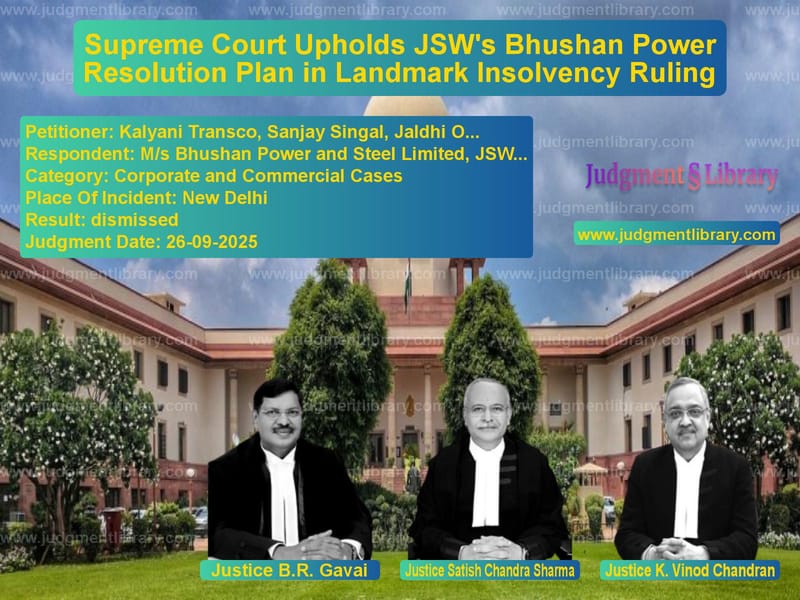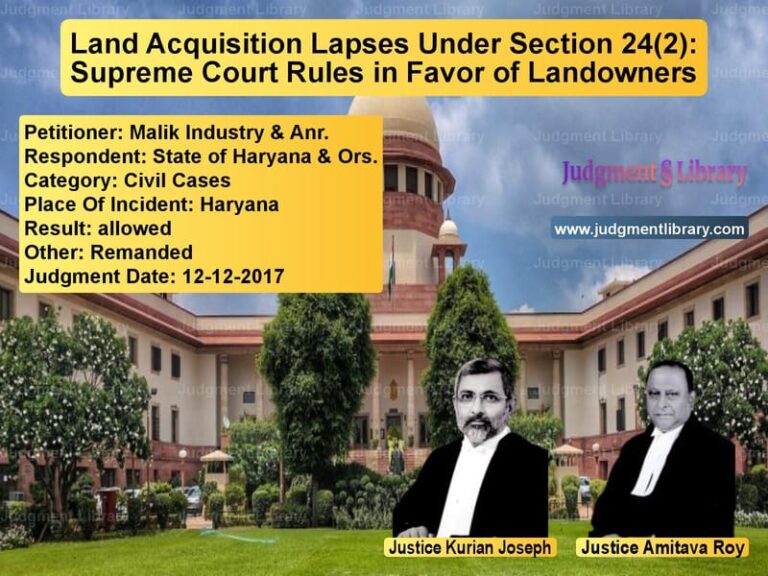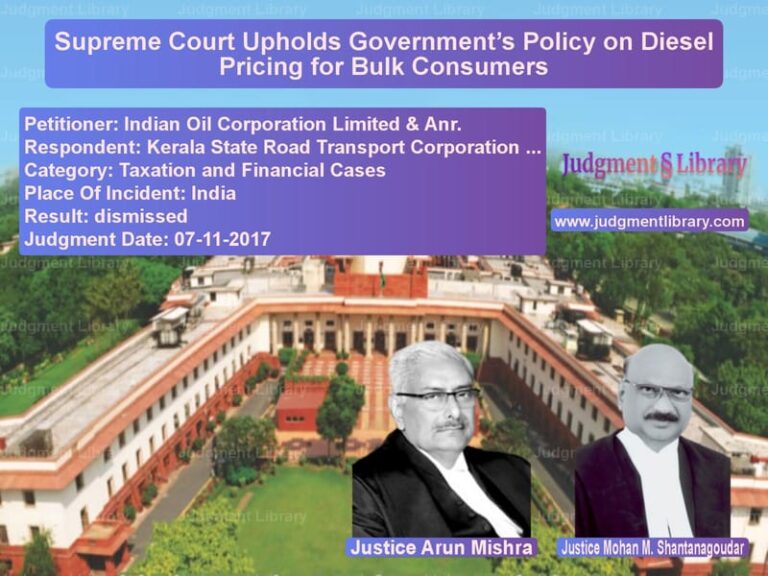Supreme Court Upholds JSW’s Bhushan Power Resolution Plan in Landmark Insolvency Ruling
The Supreme Court of India recently delivered a significant judgment that brings closure to one of the most complex corporate insolvency cases in the country’s history. The case involved Bhushan Power and Steel Limited (BPSL), one of the twelve major corporate defaulters identified by the Reserve Bank of India in 2017, and centered around whether JSW Steel Limited’s resolution plan to revive the bankrupt company should be upheld despite numerous legal challenges.
The journey began when Punjab National Bank filed an insolvency application against BPSL in July 2017, triggering the Corporate Insolvency Resolution Process (CIRP). What followed was an eight-year legal battle that tested the boundaries of India’s insolvency laws and involved multiple stakeholders including erstwhile promoters, operational creditors, financial institutions, and enforcement agencies.
At the heart of the dispute was JSW Steel’s resolution plan, which promised to inject Rs. 19,350 crore to revive the struggling steel company. However, the plan faced numerous hurdles including provisional attachment of assets by the Enforcement Directorate, claims from various creditors, and objections from the company’s former promoters who argued that the resolution process had been flawed.
The Legal Battle Over Locus Standi
One of the preliminary issues the Supreme Court had to decide was whether the erstwhile promoters had the legal standing to challenge the resolution plan. The promoters, including Mr. Sanjay Singal, argued that as personal guarantors of the corporate debtor, they fell within the ambit of “persons aggrieved” under Section 61 of the Insolvency and Bankruptcy Code (IBC).
Shri Dhruv Mehta, learned Senior Counsel for the Appellants – erstwhile promoters, submitted that “the promoters were personal guarantors of the Corporate Debtor and hence fall within the ambit of ‘persons aggrieved’ under Section 61 of the IBC. It is submitted that personal insolvency proceedings have been initiated against them, which gives them a clear locus to file the present appeals.”
However, the Court took note of the promoters’ conduct during the CIRP, observing that “the entire attempt of the appellants has been to thwart the CIRP and to not permit the same to be taken to a logical end.” The Court referenced the NCLT’s earlier findings that the erstwhile management had filed numerous applications that delayed the pronouncement of the approval order.
Despite these concerns about the promoters’ motives, the Court ultimately decided to hear their appeals on merits, noting that “since the Resolution Plan also affects the rights of the guarantors, we find that the SRA – JSW and the CoC are not right in submitting that the appeals at the instance of the appellants would not be maintainable.”
Existence of Committee of Creditors After Plan Approval
A crucial legal question addressed by the Court was whether the Committee of Creditors (CoC) ceases to exist after the resolution plan is approved by the adjudicating authority. The erstwhile promoters argued that the CoC becomes functus officio (having no further official authority) after plan approval.
The Court rejected this argument, holding that “in view of Explanation to clause 2 of Regulation 18 of the IBBI (CIRP) Regulations, the CoC continues to exist till the Resolution Plan is implemented or an order of liquidation is passed under Section 33 of the IBC.” The Court reasoned that accepting the promoters’ contention would lead to an anomalous situation where creditors would be left without recourse if the resolution plan couldn’t be implemented for various reasons.
The Court emphasized that “the CoC has a vital interest in the Resolution Plan and that such an interest would continue till the Resolution Plan is actually implemented. It is only after the implementation of the Resolution Plan that payment can be made to the creditors, of their dues, in accordance with the Resolution Plan, which has been approved by the Adjudicating Authority.”
Delay in Implementation of Resolution Plan
The erstwhile promoters heavily criticized the delay in implementing the resolution plan, arguing that though it was approved on September 5, 2019, it was only implemented on March 26, 2021 – a delay of nearly one and a half years.
However, the Court found that the delay was attributable to external factors beyond JSW’s control. The judgment detailed multiple impediments including the NCLT’s modifications to the plan, provisional attachment orders by the Enforcement Directorate, stays granted by the NCLAT, and pending criminal proceedings against the corporate debtor.
The Court noted that “both the CoC and the SRA – JSW found it difficult to implement the Resolution Plan on account of various issues including the PMLA proceedings initiated against the Corporate Debtor – BPSL and its management, the provisional attachment of properties and the unilateral directions of NCLT to distribute EBITDA etc.”
The Crucial EBITDA Distribution Question
One of the most significant aspects of the case concerned the distribution of EBITDA (Earnings Before Interest, Taxes, Depreciation, and Amortization) generated during the corporate insolvency resolution process. The erstwhile promoters and some creditors argued that this amount should be distributed to creditors rather than retained by the successful resolution applicant.
The Court delivered a crucial ruling on this issue, holding that “unless there is a specific provision with regard to distribution of EBITDA in the RfRP, permitting the CoC to raise a new stand at this stage will be totally inconsistent with the avowed object for which the IBC was incorporated.”
In a particularly significant passage, the Court stated: “If the stand of the CoC, which is sought to be taken at this stage, is to be accepted, it will unsettle the position which has been accepted by this Court that once a Resolution Plan is duly approved by the Adjudicating Authority under sub-section (1) of Section 31 of the IBC, the claims as provided in the Resolution Plan shall stand frozen and will be binding on the Corporate Debtor, its employees, members, creditors including the Central Government etc.”
The Court relied heavily on its earlier judgment in Committee of Creditors of Essar Steel India Limited v. Satish Kumar Gupta, where it had held that “a successful resolution applicant cannot suddenly be faced with ‘undecided’ claims after the resolution plan submitted by him has been accepted as this would amount to a hydra head popping up which would throw into uncertainty amounts payable by a prospective resolution applicant.”
Classification of Jaldhi as Contingent Creditor
The Court also addressed Jaldhi Overseas Pte Limited’s challenge to its classification as a “contingent creditor” rather than an operational creditor. Jaldhi held international arbitral awards in its favor and argued that reclassification reduced its entitlement under the resolution plan from 50% to just 10% of its claims.
The Court upheld the classification, noting Jaldhi’s inconsistent stance during the proceedings and its withdrawal of enforcement proceedings before the Calcutta High Court. The Court emphasized that “the CoC exercised its commercial wisdom while approving the Resolution Plan whereby the Appellant – Jaldhi was classified as a contingent creditor and such a decision is deemed to be non – justiciable.”
The judgment reinforced the principle of commercial wisdom of the CoC, stating that “the legislature purposefully did not include a means to challenge the commercial wisdom exercised by the CoC. This makes a challenge to the same non – justiciable.”
Broader Implications for Corporate Insolvency
In its concluding observations, the Court highlighted the transformative success of the resolution process, noting that “the Corporate Debtor in the present case was running into substantial losses which has now become a profit – making entity earning substantial profits. The SRA – JSW invested huge amounts in modernization and expansion of the entity.”
The Court posed a rhetorical question that captured the essence of its reasoning: “If, after the implementation of the Resolution Plan, the SRA – JSW has converted a loss-making entity into the one making profits, can it be penalised for that? Suppose if instead of the Corporate Debtor being converted into a profit-making entity, the losses would have increased, can the Corporate Debtor claim refund of the amount paid?”
The judgment ultimately dismissed all appeals and upheld the NCLAT’s approval of JSW’s resolution plan, bringing finality to a case that has been closely watched by India’s corporate and legal communities. The ruling reinforces the sanctity of approved resolution plans and emphasizes the importance of finality in the insolvency resolution process, while also clarifying several important legal principles that will guide future insolvency cases in India.
Petitioner Name: Kalyani Transco, Sanjay Singal, Jaldhi Overseas Pte. Limited, M/s. Medi Carrier Private Limited, CJ Darcl Logistics Limited.Respondent Name: M/s Bhushan Power and Steel Limited, JSW Steel Limited, Committee of Creditors, Resolution Professional.Judgment By: Justice B.R. Gavai, Justice Satish Chandra Sharma, Justice K. Vinod Chandran.Place Of Incident: New Delhi.Judgment Date: 26-09-2025.Result: dismissed.
Don’t miss out on the full details! Download the complete judgment in PDF format below and gain valuable insights instantly!
Download Judgment: kalyani-transco,-san-vs-ms-bhushan-power-an-supreme-court-of-india-judgment-dated-26-09-2025.pdf
Directly Download Judgment: Directly download this Judgment
See all petitions in Bankruptcy and Insolvency
See all petitions in Corporate Governance
See all petitions in Company Law
See all petitions in Debt Recovery
See all petitions in Commercial Arbitration
See all petitions in Judgment by B R Gavai
See all petitions in Judgment by Satish Chandra Sharma
See all petitions in Judgment by K. Vinod Chandran
See all petitions in dismissed
See all petitions in supreme court of India judgments September 2025
See all petitions in 2025 judgments
See all posts in Corporate and Commercial Cases Category
See all allowed petitions in Corporate and Commercial Cases Category
See all Dismissed petitions in Corporate and Commercial Cases Category
See all partially allowed petitions in Corporate and Commercial Cases Category







